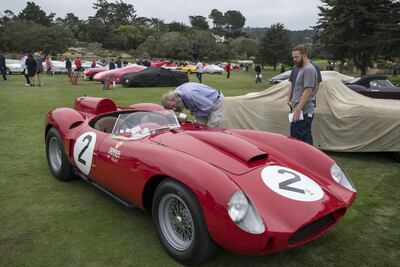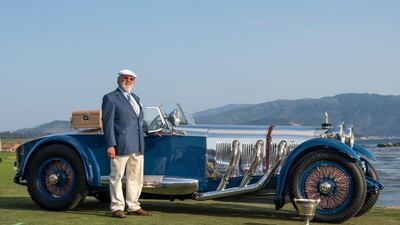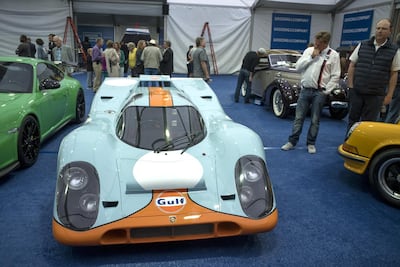It’s easy enough to build a basement cellar for your collection of Lafites and Latours or clear some wall space for your Richters and Basquiats.
But try finding room for a dozen or so vintage Ferraris, Porsches and Plymouth Barracudas.
In this dilemma some entrepreneurs and investors are seeing opportunity. Car warehouses that can store a hundred or more pricey vehicles are beginning to pop up across the US, according to car collectors and wealth managers who are witnessing the trend.
"There is demand for it," says car collector Henry Robertelli, a partner with the hedge fund Axius Holdings, who is building out a 7,000 square foot car garage in a suburban Atlanta warehouse space that’s nearly five times as large, if he wants to expand.
Indeed, many warehouses are being built by cars collectors themselves, such Los Angeles media entrepreneur Matt Farah, who says he spent "many years looking to be a customer of somebody". He’s in the process of constructing a 13,800 sq ft garage close to the beach in west Los Angeles that will hold 140 cars. He has a waiting list of 85 people already lined up and ready to pay between $850 to $1,500 per month per parking space when the facility opens next summer, he says.
It’s been a four-year process, says Mr Farah, who hosts a weekly podcast called The Smoking Tire and whose YouTube channel of the same name counts more than 850,000 subscribers. It took him two years to find the right property and and another two years to design the $10 million project to stringent fire and safety standards; the building should be able to withstand a 12-point earthquake - "literally an apocalypse", he says
If the warehouse is as successful as he hopes, he wants to expand to other markets that share similar residential characteristics with the Venice beach area of Los Angeles: "My business model depends on putting these things in places with a lot of money and no parking."
Car collecting, of course, is nothing new. Think Jay Leno and his 100-plus vehicle assemblage or Jerry Seinfeld with his dozens of Porsches.
Car condos also have been around a while, largely serving select customers who might deck out their garage spaces with bars, full kitchens and sometimes even a movie theatre.
What’s changed is the hobby is starting to attract the kind of broad-based interest the wealthy have long lavished on easier-to-store luxuries like fine wines and abstract art.
"I’ve been doing this a long time and I’ve seen it really shift in the last couple of years," says Timothy Sheehan, a senior director with BNY Mellon Wealth Management in Atlanta. "It’s gone from people wanting to have the great contemporary art collection or collecting wine to what we’re seeing now: rich people are going after cars."

Most collectors prefer to keep their cars somewhere other than their residences, Mr Sheehan says. So far, though, car-storage facilities have yet to become a true warehouse market, says Dan Wagner, a director of research and analysis for CBRE Group.
"The collector market is more of a niche market," Mr Wagner says. "They don’t typically demand a 300,000 sq ft warehouse."
Collectors are snapping up everything from vintage Mercedes and Ferraris to 1960s muscle cars like Chevy Chevelles and Plymouth Barracudas to brand new limited edition cars such as the Porsche 911 Turbo S Exclusive. Mr Farah’s car collection contains a Porsche 911, a Lamborghini and a Mercedes SL 500, among others. "Rather than play the stock market," he says, "I collect cars."
Also in big demand is the official transportation of the peace-and-love, money-bashing Woodstock generation: the beat-up Volkswagen bus. "You could have bought one of those on the side of the road for $200," Mr Robertelli says. "Now people are restoring them and they are bringing well into the six figures."
Meanwhile, the attraction of vintage automobiles is well appreciated in this region as evidenced by the annual Amchit International Festival, which in August brought classic vehicles to former Lebanese President Michel Sleiman's boulevard seafront in Lebanon.
The festival, endorsed by the Lebanese Ministry of Tourism and the Lebanese Ministry of Culture, has now run for five years and includes music and social activities. Fifty cars from 1929 up to 1970 were displayed during the event which ran from August 17 to 26.
_______________
Read more:
Classic cars on show at Lebanon's Amchit International Festival - in pictures
Classic car collectors can learn from the $48.4 million 1962 Ferrari sale
_______________
And the interest in classic cars is making itself felt in Europe, too.
Bankers in Germany’s automotive heartland have a recommendation for investors seeking alternatives to low interest rates: vintage cars from their region.
“For customers with more than €1 million (Dh4.2m) in liquid assets, a classic car can be an attractive addition to their portfolio in terms of yield and value stability,” says Jens Berner, vintage car expert at Suedwestbank’s asset management unit. “After the financial crisis, requests for alternative investments such as art, wine or classic cars had risen sharply.”
To better compare vintage cars with other asset classes, the bank some time ago started the OTX Classic Car Index, comprised of vehicles that are at least 30 years old and come from manufacturers in southern Germany where Suedwestbank is based, such as Audi, BMW, Daimler and Porsche. From the start of 2005 to the beginning of 2018, the OTX quadrupled, easily beating the 204 per cent gain for Germany’s main stock index DAX.
Suedwestbank, which is part of Bawag Group, an Austrian lender partially owned by Stephen Feinberg's Cerberus Capital Management, calculates the index once a year by multiplying model prices provided by specialist magazine Motor Klassik with registration numbers from the Federal Motor Transport Authority. The 20 cars with the highest values make up the index.
The OTX isn’t the first classic car index in Germany, but it focuses on the country’s prosperous south, where the big luxury car makers are based. Owners of Porsche 911 classic cars were especially fortunate, with cars in that model series increasing almost eight-fold - 683 per cent - in value in the past 13 years.
“Classic cars can be a good investment if you buy the right car at the right time and at the right price,” says Frank Wilke, managing director of vintage car market observer Classic-Analytics.
Caution should always be exercised with classic car investments, says Mr Berner. He advises that investors always consult an expert.
“Counterfeits are a big issue, for example when a vintage car is first disassembled into individual parts and then re-assembled into two cars by mixing it with some new parts,” he says. “If there are suddenly 300 cars on the market of a series of which only 200 were originally built, then something is wrong.”
Liquidity, too, can be a problem, depending on the model.
“For some vehicles, there are only a few potential buyers, but for others, such as the Porsche 911, the market is relatively large,” he says.
He advises customers to invest only in vintage cars with a minimum value of €100,000. At lower prices, the cost for expert reports, taxes, insurance, storage and maintenance are proportionally bigger drags on the return, he saya. At most, a classic car should make up 10 per cent to 15 per cent of a portfolio.
“If you have a good stock, some say it’s best to put it into a safe for five years and see how it has developed,” said Rainer Dschuedow, managing director at classic car marketplace Pyritz Classics.
“You should also handle a classic automobile this way. If your darling remained stable or did gain in value, you should be happy.”


